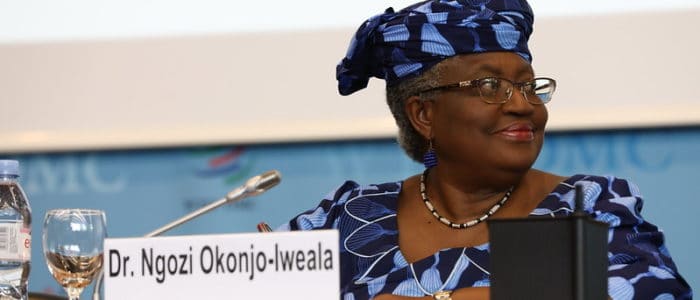Published
What’s in Store for the New WTO Director-General?
By: Stuart Harbinson
Subjects: WTO and Globalisation

The appointment of Dr. Ngozi Okonjo-Iweala as the new Director-General of the World Trade Organization has been called historic. She is the first female and first African head of the Organization – a breakthrough in a field long dominated by men, mostly from developed countries. It’s a genuine cause for celebration and congratulation.
Unfortunately, the warm feeling won’t last long because the new Director-General’s inbox is overflowing. The WTO is under pressure on just about every front – from a broken dispute settlement system, to coping with the pandemic, to stuttering negotiations, to inadequate transparency provisions, and even to fundamental disagreements about purpose.
Naturally enough, everyone involved looks to the change of regime as an opportunity for a reset. In campaigning for the job, all of the candidates necessarily portrayed themselves as up to the challenge and having a plan to deal with it. There is always a tide of rising expectations in these situations.
It would be too much to expect Dr. Okonjo-Iweala, now that she has finally been appointed, to be entirely immune from this syndrome. She must project, and indeed is projecting, a sense of renewal and reinvigoration. As she tweeted on 15 February: “forget business as usual”.
So far so good, but the new Director-General also needs to strike the right balance between leadership and putting the responsibility for the current mess in the WTO where it mostly belongs – on the shoulders of the Members themselves. The WTO may be very far from perfect but there is no institutional fix given the conflicting array of national trade policies with which she is confronted.
Outgoing Deputy USTR Dennis Shea made some interesting observations in a valediction in Geneva in December 2020. He did not blame the institution for the sad state of the WTO – perhaps he thought he had already fixed that by neutering the Appellate Body. Rather, he cited a “lack of like-mindedness” among the membership as the main problem. In particular, he pointed to an unwillingness by some governments to accept that the WTO is a market-oriented institution; the preoccupation of some members with extracting benefits from the organization while exempting themselves from its rules; and the poor record on concluding negotiations.
Many might take issue with specific elements in Shea’s diagnosis. But the general point – that the membership disagrees on fundamental issues – has been borne out by developments (or lack of them) in the last ten years and is surely valid. It is this frustrating lack of multilateral consonance which has propagated multiple plurilateral initiatives on the margins of the WTO.
The G20 appears to have some sight of the problem and attempted to address it in 2020 through the “Riyadh Initiative on the Future of the WTO”. However, G20 countries were only able to agree at a very general level to reconfirm their commitment to the objectives enshrined in the Marrakesh Agreement Establishing the WTO. Thank goodness for that!
When it came to considering the “foundational principles” underpinning the WTO, the G20 could only agree on a trite list of undefined generalities such as transparency, non-discrimination and inclusiveness.
This is the environment into which the new Director-General is venturing. In her statement of acceptance to the General Council, she said that, in order to restore its credibility, the WTO needed to deliver early success and results. She signalled the Twelfth Ministerial Conference (expected to be in December this year) as the time to reach agreement on some of the pressing issues and to elaborate on work programmes for others.
Creating time pressure is indeed a time-honoured modus operandi in the WTO. However, the Director-General should be careful not to assume responsibility for meeting any deadlines. She can persuade, cajole and assist though developing creative solutions. While being an active enabler, she should ensure that she places the onus squarely on Members to reach agreement. Any success or failure should primarily be theirs’, not hers. Time will tell if they are up to the job as she is.
On the ball Stuart. I am not sure her experience as World Bank figure will be enough to wrench the WTO out of its mess.